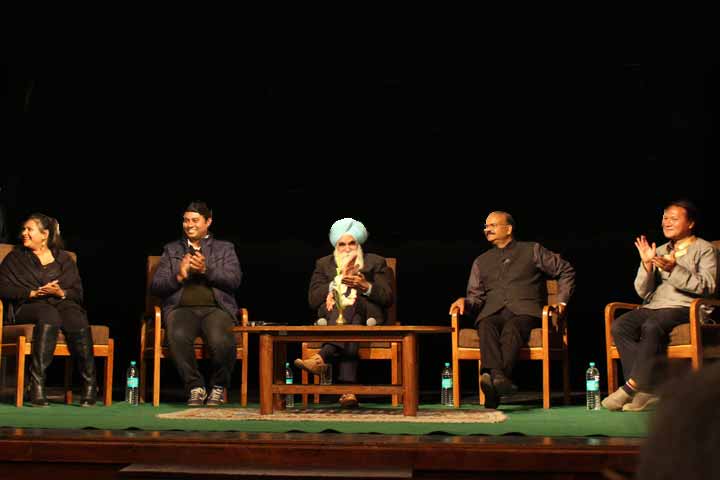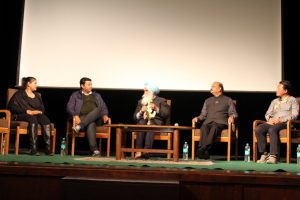
08 Dec Talking Faith for Peace
Woodstock student Taarini Gupta writes about Talking Faith for Peace, a special event bringing together speakers from some of India’s major religions.
On 26th November 2016, an event which deeply inspired me and changed my views about religion and faith took place in Woodstock School’s Parker Hall. Organised by the Centre for Imagination and the World Integrity Centre with the support of the Uttarakhand Minorities Commission, Talking Faith for Peace featured panelists from five of India’s main religions. Hindol Sengupta represented Hinduism, Nazia Izuddin represented Islam, Professor Harbhan Singh represented Sikkhism, Rev. Dr. P. Satish John, represented Christianity, and Norbu Wangchuk represented Buddhism.
Honestly, it was something that I was dreading because world religions isn’t my favourite class. I thought I’d fall asleep and I heard a lot of students complaining, but once the panel started, I realised that this wasn’t something we learn in our classes, instead it was completely different. I learnt that religion and faith are more than what I thought they were. I once read that religious thoughts trigger reward systems in our brain such as feeling love or listening to music, but I never thought it was true until the day I got be a part of this amazing event.
What does religion mean to you?
Some really thought-provoking conversations took place. The first question that was asked was, “What does does religion mean to you?” For Reverend John, religion has a conflicting meaning since there are a number of conflicts taking place all over the world in the name of religion. He also said, “I’m reluctant to say I’m from any religion but I am proud to be Christian.”
For Professor Singh, religion has no beginning and no end. He also added to Reverend John’s point, “Religion is created by association with mankind. It also teaches us tolerance; if religion creates conflict in humanity, then there is no point of it.”
"A lot of people confuse faith with religion and vice-versa but I learnt that they are completely different; you can have faith but no religion or vice-versa and your faith and religion can be completely different."
Hindol Sengupta had written a book, Being Hindu, because it wasn’t clear to him why he should take an identity derived from his parents. For Norbu Wangchuk, above everything, humanity is his religion. He also talked about how everyone has a ‘monkey mind’. At first I just laughed, because I didn’t fully understand what he meant but as he explained its meaning, I realised how relevant and relatable it was. He said that our mind never stays still, we’re always over thinking and calculating our every move, thus the name ‘monkey mind’, which I thought was extremely clever. He was trying to say that our thoughts are the cause of depression, we think ourselves into sadness and anxiety. Buddhism is all about trying to keep the mind still, which made me realise that Buddhism is psychology in religious form. Of course there is more to it, but this point really stood out to me.

For Nazia Izzudin, there are two aspects of religion in her life, “One is my personal relationship with god, my personal quest. The second is how it allows me to interact with the World.” She likes to dress without conforming to the Islamic standards, which once offended a Muslim Professor in another event, but she wasn’t one to just sit there quietly, she had to stand up for what she thought was right and added, “Religion gives you an inheritance, and when someone questions that and says, “You don’t look the way we want you to look” or “You don’t speak our language; you’re not a good muslim.” I ask them, “Who are you to tell me?” People like us will not fit in politics because we think differently.” Her response left me shocked, because her boldness was extremely refreshing.
The role of faith and spirituality
Another question asked was, “How do faith and spirituality play a role in religion?” Faith is a very confusing term for me because, until that day, I never fully understood what it meant. But the panel helped me to understand what it really means, Hindol Sengupta said, “The distinction between religion and spirituality has been brought by commercialisation. The ‘isms’ are the problem, there is no difference between religion and spirituality.” I don’t think I agree with him because of what the other panellists said. According to Norbu Wangchuk, “[…] spirituality refers to actions. By your actions you can reach levels of realisations.”
"Today’s generation, including me, doesn’t care much about religion, faith or spirituality but what we don’t realise is that we follow all these traditions without even realising."
Nazia Izzudin had a lot to say about this topic, and I think I fully agreed with her. She said, “Spirituality can exist beyond religion. But religion plays an important role in playing out faith and spirituality in a more social sense. Faith allows me to challenge my religion, challenge things like inequality. Fundamentally I cannot believe in a religion that propagates inequality.” She gave us an example that she fell in love with a Hindu boy and they went through eight years of planning about how to live together in India because a relationship between a Muslim and a Hindu is usually frowned upon and unheard of. She added, “Someone asked me, “How was your experience in a Muslim University?” I answered, “It was very unequal, the traditions were very unequal.” My faith does not believe in a gender divide and it comes in the way of my religion. No one can take my faith away from me just because I questioned my religion.”
A lot of people confuse faith with religion and vice-versa but I learnt that they are completely different; you can have faith but no religion or vice-versa and your faith and religion can be completely different.
I think a conversation such as this was needed. Today’s generation, including me, doesn’t care much about religion, faith or spirituality but what we don’t realise is that we follow all these traditions without even realising. Religion is something we see and experience in our day to day lives, which is why it matters. It matters because it leads to mind blowing realisations, I know that now because this event left me thinking, “WOW!”.
Taarini Gupta, Woodstock Student






Reena lamba
Posted at 22:44h, 09 DecemberGreat piece.being a Woodstock student,proud to see the school have such great people getting together on these forums.well done and bless all happening there at this great school